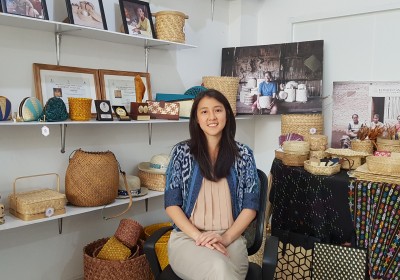Du’Anyam: Weaving Tradition, Empowering East Indonesian Women
June 08, 2018
Azalea Ayuningtyas, CEO and the Co-Founder of Du’Anyam with the background of woven products from housewives in Flores, East Nusa Tenggara.
Fransiskus Kumanireng was angry with his wife, Meliana Adinda Soge. Du’a Mili, the nickname of Meliana, seemed busy weaving without actually neglecting her household duties. He almost burnt his wife’s woven products.
“It’s enough for you to just cook at home!”, said Azalea Ayuningtyas, the CEO and the Co-Founder of Du’Anyam when encountered in May.
The Du’Anyam partner was then hiding woven mats in her neighbor’s house. After Du’a Mili met the targeted amount, Du’Anyam bought the woven products. She then used the money to fulfil daily necessities, from buying nutritious foods for her kids to saving it for possible urgent needs. She did all of that secretly.
Later on, Fransiskus was curious why his wife didn’t frequently ask for money anymore. After he found out the answer, he has since then supported his wife’s business. Additional income from weaving is also used to finance their first kid who already graduates from senior high school.
“When the order is high, the husband is even willing to help washing dirty plates or taking care of the house,” Ayu said.
That is one of the success stories of the women living in Flores, East Nusa Tenggara, thanks to empowerment program from Du’Anyam. Ayu said Du’Anyam is a social business that serves as one of the solutions to reduce gap in disadvantaged areas, like those in Flores. She and her two fellows, Melia Winata, and Hanna Keraf, has reasons to empower mothers in Flores.
Ayu said there were three rooted social economic problems in Flores. The first one is the Flores mothers find it difficult to access cash money because they rely on farming products and shipments from their relatives who work as migrant workers. They find it difficult to collect for just Rp1.000-Rp2.000 when there is a government program that requires cash money, like childbirth saving project.
Secondly, destitution that causes minimum availability of healthy foods and tough jobs in farms. As a result, born kids have low body weights. The third reason is women’ voices are less considered. All decisions are taken by husbands or male family heads.
On the other hand, Du’Anyam sees the mothers have weaving skills that have been sent down from generation to generation. Moreover, papyrus as the raw material is easily found in East Nusa Tenggara. Unfortunately, their woven products were only for daily outfits or changed with other necessities even though, Ayu said, the products could be sold in domestic or international markets as the trend was heading to handmade and eco-friendly items.
This is where the idea of setting up Du’Anyam comes up in 2014. Du’Anyam, which means “mother who weaves”, intentionally chooses female groups, not from business players, to help them come out from social economic-related problems.
“We don’t want to give fish, but the hook. We will even assist them how to fishing well,” said Ayu, making an analogy of the social business.
Women empowerment is felt more effective to tackle the social economic gap in disadvantaged areas. Housewives, who previously only take care of families and livestock, will become more productive thus they can earn additional income for their families. According to Ayu, a research result says money that will go into the women’ pockets will be used to meet nutrients necessities and children education compared to money obtained by men.
Indirectly, healthy kids who have their nutrients fulfilled will experience optimum brain development. Next generation will enjoy better social economic condition coupled by proper education compared to their parents.
Those innovations from Du’Anyam become good practice examples to overcome economic social gap in regions. Those sort of solutions is expected to come out during Indonesia Development Forum 2018. IDF 2018 will highlight ‘Pathways to Tackle Regional Disparities across the Archipelago’ theme. The forum that is initiated by the National Development and Planning Agency or Bappenas and is supported by the Government of Australia through Knowledge Sector Initiative (KSI) aims at keeping development sustainability based on knowledge, experience and fact for supporting accelerated development in Indonesia to be more equal and more sustainable.
Now, Du’Anyam successfully has worked with almost 500 thousand mothers in Flores, East Nusa Tenggara. Woven products from Du’Anyam that contains tradition values sell quickly up to between 3,000-4,000 pieces in local and international markets. Up to now, about 35,000 products from Du’Anyam are already sold. Revenues that go into the Du’Anyam’s partners keep rising. Data from Du’Anyam reveals that daily average income for the firm’s partnered mothers increases by about 40%.
“(The rise) is actually various, some even get threefold-fourfold, some get lower than that,” Ayu said.
The rise is also followed by the amount of saving that goes up by about 55% on average. And what number couldn’t measure is, according to Ayu, women’ voices in their families are as equal as men’.
In the future, Du’Anyam doesn’t only wish the good results enjoyed by mothers in Flores, East Nusa Tenggara. She and her pals plan to open Rumah Anyaman Indonesia or Indonesia Weaving House. Since 2017, they have initiated three new locations for accompanying women. The locations are in Berau, East Kalimantan; Sidoarjo, East Java; and Nabire, Papua. **
Indonesia’s Research Institutions Supporting the Development of the Electric Vehicle Industry
Indonesian Muslim Fashion and Cosmetics IKMs Shine at Dubai World Expo 2020
Govt Steps Up UMKM Transformation Efforts in the Midst of Pandemic Slowdown
Govt Encourages Promotion of IKM Products in Digital Era
Government Begins Developing Maritime Training Center in Makassar
Tweets by IDDevForum
